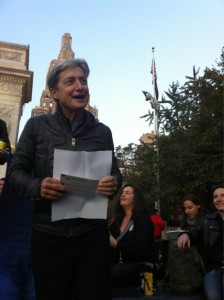After a month in which I’ve been able to focus on Occupy, this week has been a blunt return to the vertical: the University. Today I worked on a third-year tenure review, chaired a PhD proposal orals and participated in the first half of a two-day Mellon-funded open peer-to-peer review process. In short, I spent all day reviewing, or considering how to review, my “peers,” whether we construe that as my equals or those in a feudal relation of dependency. (By the way, a good number of students dropped my class on Politics and Visual Culture: but as many others added it–more follows).
So much time in purported judgment of others: often in fact deferred or displaced but the subject of much real or attributed “fear.” In this afternoon’s discussion, fear meant the worry that many academics feel about using digital media to disseminate their work, as to whether tenure and promotion committees will approve it as “refereed publication.” Employment concerns are entirely valid and real. We also need to recognize that the tenured and tenure-track faculty are a minority in the university teaching workforce and that many would be grateful to have such concerns.
Or we can look at a place like Egypt, where, despite the intense triangular struggle between the secular revolution, the Islamic forces and the Armed Forces, a group like Mosireen, the video collective I often refer to, can state:
The Mosireen workspace is open to everyone, regardless of their level of experience. We see a big part of our role as helping network between a wide variety of initiatives and projects, especially those born out of a spirit of civic engagement.
When we talk of “open” peer review in the quiet world of US academia, or of the “revolutionary” digital humanities, we should step back in respect to those committed to horizontal practice in the midst of a shooting war, exactly the situation often used to justify vanguard leadership.
I don’t intend to take the sanctimonious position that only the decolonial revolution can be in the right. A remarkable action by Occupy Baltimore shows what can be done. Along with many other delegates to the American Studies Association, I visited Occupy Baltimore last November. It was at this point that I felt we really had a national movement going. In a city where there was little media attention to their actions even locally, let alone nationally, a group of Occupiers had set up in a desolate space on the waterfront. They held a GA that lasted from 8 to past 10 when I gave up, feeling cold.
This January, despite the evictions, Occupy Baltimore demonstrated under the slogan “Schools Not Jails” and for good reason:
the Schools Not Jails Occupation took to the streets of Baltimore, brought public attention to the struggle against the State of Maryland’s plan to build a $104 million youth jail in East Baltimore – the budget for which could easily supplement and expand the City of Baltimore’s education funding, and prevent our recreation centers from being closed or privatized. We entered the site of the proposed detention center, and built a little red schoolhouse on the empty lot, to symbolize our desire for a city that prioritizes Schools, not Jails.
It transpired that, after the protest, this item did not in the end appear in the state budget, a horizontal victory for the movement, far from the spotlights of global media attention. All of us who loved The Wire, who use it in education and elsewhere, should be part of this movement.
These kinds of interfaces are perhaps exemplified by the Occupy Archive, who have created an open source, open access set of materials for activists, researchers and current/future scholars:
#Occupy Archive is documenting and saving the digital evidence and stories from the Occupy protests worldwide that began in September 2011 in Lower Manhattan. Occupy Wall Street (OWS) inspired groups to form in small towns and large cities around the world. # Occupy Archive seeks to represent each of those groups with individual collections.
There is a horizontal affiliation between these networked education and empowerment projects that those of us more ensconced in the vertical “research” university would do well to learn from and about in the effort to reconsider what the function of such institutions might be before the inevitable bursting of the education bubble. The tidal wave of one trillion dollars in student debt is about to break and the future is uncertain.
My modest proposal would be that a university program in the humanities would be a place where people might collectively experiment as to what “democracy” might mean for them. I know it’s “unrealistic” but then, how realistic is it to go to university to get a job?

